Category: Taxation

ISAs: End of Tax Year Reminder
This time of year presents an opportune moment to examine both your personal and business finances to ensure they are structured to optimise your tax efficiency. Despite the ongoing freeze on many tax rates and thresholds, numerous strategies remain for organising your financial matters tax-efficiently. We've outlined some of the key areas in which you are able to make the most of tax-saving measures before the deadline arrives:

Spring budget 2024
Jeremy Hunt delivered his fourth statement as Chancellor of the Exchequer with a Budget focused on long-term growth and improving domestic prospects. The biggest issues that he looked at addressing included productivity, taxation and domestic market support.

Our Guide to Year-End Tax Planning
As we approach the end of the tax year on 5 April 2024, it presents an ideal opportunity to assess and leverage the various allowances and reliefs available to enhance your tax profile. Allocating time for this review can provide valuable insight into potential opportunities for you and your family.

Expanding Horizons: Tean Hatt
We’re thrilled to announce the newest addition to the Vizion Wealth family, Tean Hatt, a seasoned and highly knowledgeable financial advisor with an impressive track record in the industry. I’m personally delighted because I worked with Tean for 5 years at Hargreaves Lansdown until 2011 when i left to set up Vizion Wealth. Tean's arrival not only strengthens our advisory team but also reaffirms our commitment to providing top-notch financial advice and services to our clients nationwide.
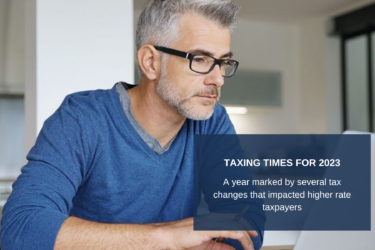
Taxing Times for 2023
As we approach the end of the year, taxpayers should begin assessing their tax obligations. This is not a task to be left to the eleventh hour, especially considering tax changes coming into effect in 2024. By understanding your tax obligations early on, you could avoid unwelcome surprises.

Missing out on unclaimed money that could be in your pocket?
According to recent research, higher rate and additional rate taxpayers in the UK leave millions of pounds of pension tax relief unclaimed yearly. This amounts to a staggering total of £1.3 billion over a five-year period. This unclaimed money could be in your pocket instead!
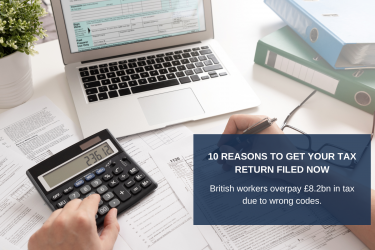
10 reasons to get your tax return filed now
Filing your tax return early offers many benefits, from avoiding penalties and reducing stress to maximising eligible deductions and protecting against identity theft.

Passing on assets Tax-efficiently
Are you concerned about the impact of Inheritance Tax (IHT) on your estate? It’s natural to want to leave behind a legacy for your loved ones, but without the right plan in place, a significant portion of your wealth could be subject to Inheritance Tax. With IHT affecting more and more families, it’s crucial to be proactive and plan accordingly. In most cases, it’s better to begin Inheritance Tax planning as early as possible in order to ensure that your estate is adequately protected. Investing in other options like trusts or leaving money to a registered charity may also provide...

Spring budget 2023
The Spring Budget 2023 was delivered by Chancellor of the Exchequer, Jeremy Hunt, on March 15. Among key changes announced were those made to pensions, aimed at making it easier for individuals to save for their retirement and encouraging retirees to return to work.

Wealth Succession
Financial planning can be a daunting and uncomfortable conversation for many, but thankfully attitudes towards talking about money are changing. Wealth succession should be an integral part of your financial plan as early as possible – because the right preparation now can have positive long-term impacts on future generations.

Time for a tax health check?
Personal tax planning should be at the top of your agenda as the end of the current tax year is not too far away. Taking action now may give you the opportunity to take advantage of any remaining reliefs, allowances and exemptions. At the same time, you should be considering whether there are any planning opportunities that you need to consider either for this tax year or for your long-term future. We’ve listed a few reminders of the issues you may want to consider as worthy of including in your 2022/23 tax health check to-do list.

Minimising or even avoiding Capital Gains Tax Liabilities
Gains are calculated by subtracting the purchase price and related expenses (such as sales charges) from the selling price. They are generally taxed at a rate higher than income taxes in order to discourage speculation. If you plan to sell assets that have appreciated in value, such as real estate, stocks or bonds, it is important to be aware of CGT and how it can affect your bottom line. Proper planning can help you minimise or even avoid CGT liabilities.
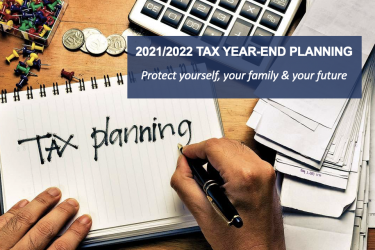
2021/22 Tax Year-End Planning
As another tax year end approaches, it’s important to finalise your 2021/22 tax planning to reduce your obligations wherever possible. The current tax year started on 6 April 2021 and ends on 5 April 2022. Reviewing your tax affairs now will enable you to make the most of any allowable deductions and strategies available to minimise or mitigate a potential tax burden.
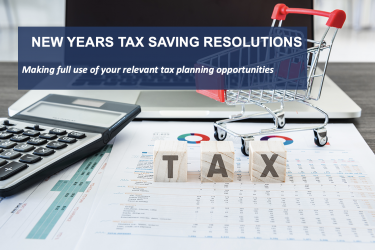
New Years Tax Savings Resolutions
With the tax year end (5 April) on the horizon, taking action now may give you the opportunity to take advantage of any remaining reliefs, allowances and exemptions. We have provided some key tax and financial planning tips to consider prior to the end of the tax year. Now is also an ideal opportunity to take a wider review of your circumstances and plan for the year ahead.

Changing Tax Landscape
Tax planning should enable you to arrange your affairs in ways that postpone or legally avoid taxes. No one likes to pay tax on their hard-earned money, so by employing effective tax planning strategies you could have more money to save and invest or more money to spend. Or both. Your choice.

Wealth Preservation
The rules around Capital Gains Tax (CGT) are complex and they differ depending on your financial situation. It’s a complicated tax and, as a result, some people may get confused about how much they should expect to pay. WHAT IS CAPITAL GAINS TAX? Capital Gains Tax is a tax payable on the profits (or ‘capital gains’) you make from selling certain assets. These assets include some property, items of value such as art, jewellery or collectables, company shares or other investments, and businesses or business assets.
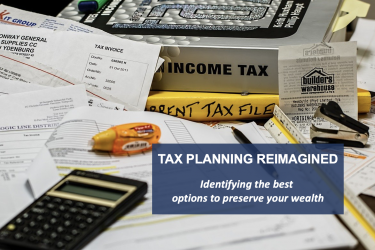
Tax Planning Reimagined
No one likes to pay tax on their hard-earned money. But due to the complexities of the tax system, without expert professional financial advice, some individuals could be paying more tax than necessary. Before the end of every tax year on 5 April, you have the opportunity to save money on taxes and plan for the year ahead.

Reducing your Inheritance Tax Bill
Even those who believe they have moderate wealth levels may still need to take action to minimise Inheritance Tax, particularly if they own property and have savings and investments. Naturally, you’ll want to pass on as much as possible to your loved ones, rather than paying 40% to HM Revenue & Customs (HMRC). Are you worried your family could be left with an Inheritance Tax bill after you’re gone?
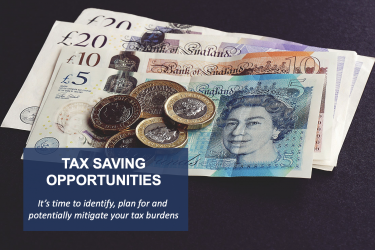
Tax Saving Opportunities
While the Chancellor of the Exchequer Rishi Sunak, is looking to reduce the tax gap, there are nonetheless still opportunities to review your financial arrangements for saving tax throughout the tax year. Taking action now will give you the opportunity to take advantage of any remaining reliefs, allowances and exemptions before the end of the 2020/21 tax year on 5 April.

2020/2021 Year-End Tax Planning
Tax never requires a one-size-fits-all approach. Each taxpayer and each year will be different. And with the end of the current 2020/21 tax year approaching on Monday 5 April 2021, now is the time to carry out a tax health check and implement any planning opportunities.
